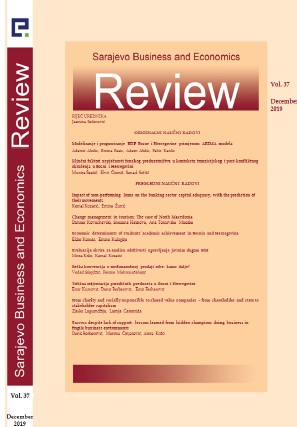MODELLING THE EMPLOYMENT IN CROATIAN HOTEL INDUSTRY USING THE BOX-JENKINS AND THE NEURAL NETWORK APPROACH
MODELLING THE EMPLOYMENT IN CROATIAN HOTEL INDUSTRY USING THE BOX-JENKINS AND THE NEURAL NETWORK APPROACH
Author(s): Tea BaldigaraSubject(s): Business Economy / Management, Methodology and research technology, Economic development, Tourism, Human Resources in Economy
Published by: Ekonomski fakultet u Sarajevu
Keywords: Employment; Croatian hotel industry; Box-Jenkins methodology; Neural networks methodology; Forecasting accuracy;
Summary/Abstract: Purpose of the research – Hotel industry is a fast-growing worldwide sector, playing an important role in many economies, always looking for improved methodologies capable to provide more accurate key determinants forecasts. It is a well-known fact that the hotel industry is the most propulsive sectors and among the most significant generators of Croatian economic growth and development. The aim of this paper is to investigate and compare the performances and the forecasting accuracy of different models in the attempt to define the data generating process of the number of employees in Croatian accommodation establishments. Methodology and data – Starting with the assumption that hotel industry is a human-driven sector, and that the human factor is one of the most significant factors of successful business performances, the paper seeks to explore the forecasting accuracy of the Box-Jenkins and the neural network methodology in modeling the monthly number of employees in Croatian accommodation establishments. Considering the pronounced seasonal component and the non-stationarity of the analysed time-series various structures of the seasonal autoregressive integrated moving average models (SARIMA) were experimented and different neural networks architecture were trained and tested. After the modeling phase, the forecasting accuracy and the model performances were analysed. Model performance and forecasting accuracy evaluation was tested using the mean absolute error, the mean absolute percent error and the square root mean square error. Results - The diagnostic testing show that in, modelling the seasonal time series of the number of employees in Croatian accommodation establishments, the neural network model outperformed the Box-Jenkins methodology; a methodology traditionally used in forecasting time-series with a pronounced seasonal component. Conclusions and implications – Given the importance of the hotel industry for Croatian economic development and international competitiveness enhancement, the research results could be useful, for both, researchers and practitioners, in the process of planning and routing the future Croatian hotel industry development and business performances improvement.
Journal: Zbornik radova - Sarajevo Business and Economics Review (SBER)
- Issue Year: 2020
- Issue No: 38
- Page Range: 79-96
- Page Count: 18
- Language: English

